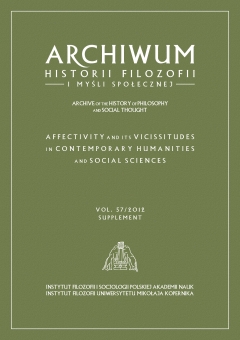On Hume’s Theory of Passions
On Hume’s Theory of Passions
Author(s): Gábor BorosSubject(s): Philosophy, 17th Century
Published by: Instytut Filozofii i Socjologii Polskiej Akademii Nauk
Keywords: Hume; cognitivism; Descartes; pride; generosity; love; sympathy;
Summary/Abstract: The paper’s main task is to show how much Hume’s philosophy of passions is indebted to and continues the tradition of the philosophy of affects of the 17th century, in spite of the obvious fact that he departed from the main philosophical project of the 17th century, the tripartite unity of mathematics, metaphysics, and mechanical physics. A restructuring of Hume’s order of passions and its comparison to the order followed by Descartes will show up a special „cognitivist” character of Hume’s thinking on emotion, even if the special experimental framework of Hume’s theory of passions prevents him from theorizing about the free will’s distinguished role in our lives or about the will’s grounding in the concept of a providentially active biblical God.
Journal: Archiwum Historii Filozofii i Myśli Społecznej
- Issue Year: 2012
- Issue No: 57supl.
- Page Range: 17-30
- Page Count: 14
- Language: English

